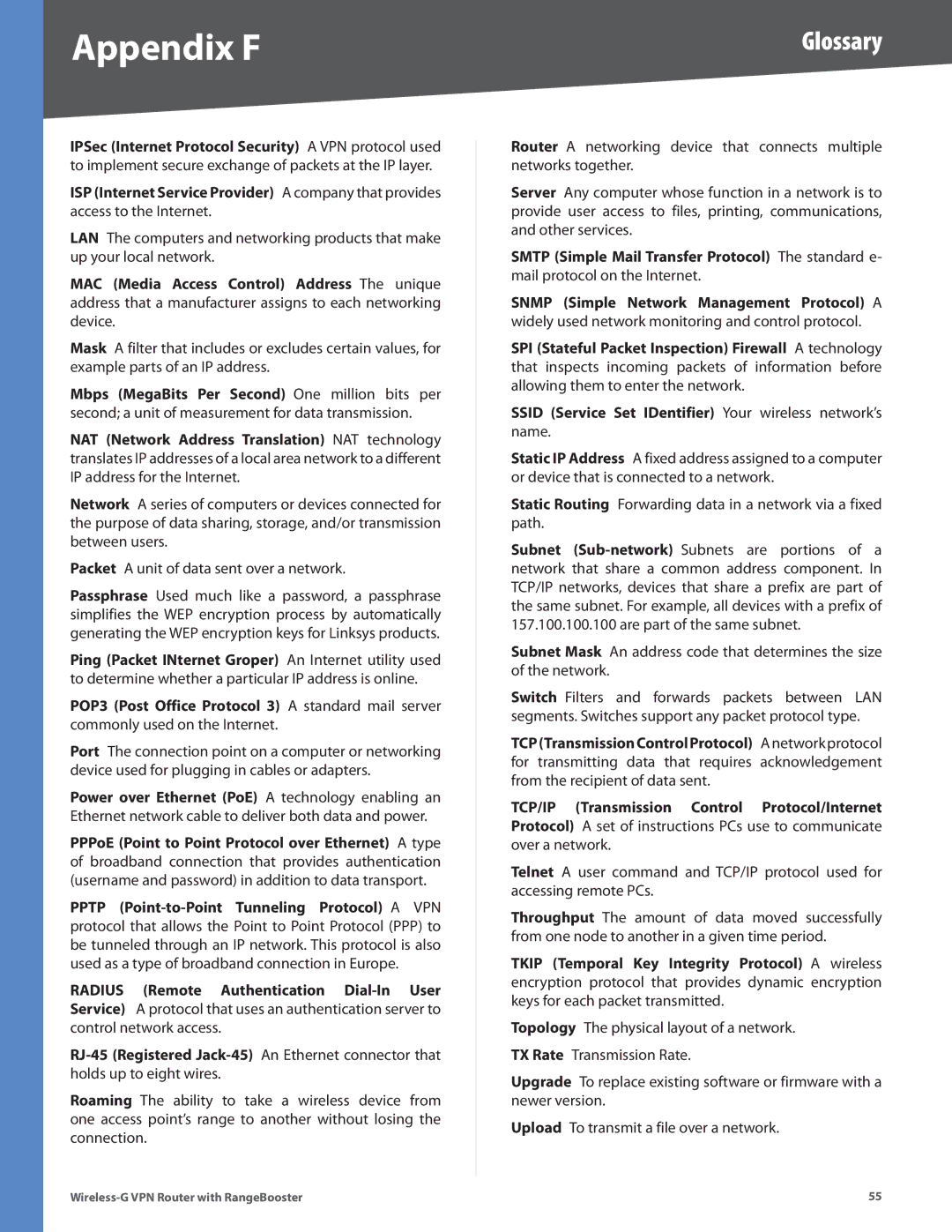
Appendix F | Glossary |
IPSec (Internet Protocol Security) A VPN protocol used to implement secure exchange of packets at the IP layer.
ISP (Internet Service Provider) A company that provides access to the Internet.
LAN The computers and networking products that make up your local network.
MAC (Media Access Control) Address The unique address that a manufacturer assigns to each networking device.
Mask A filter that includes or excludes certain values, for example parts of an IP address.
Mbps (MegaBits Per Second) One million bits per second; a unit of measurement for data transmission.
NAT (Network Address Translation) NAT technology translates IP addresses of a local area network to a different IP address for the Internet.
Network A series of computers or devices connected for the purpose of data sharing, storage, and/or transmission between users.
Packet A unit of data sent over a network.
Passphrase Used much like a password, a passphrase simplifies the WEP encryption process by automatically generating the WEP encryption keys for Linksys products.
Ping (Packet INternet Groper) An Internet utility used to determine whether a particular IP address is online.
POP3 (Post Office Protocol 3) A standard mail server commonly used on the Internet.
Port The connection point on a computer or networking device used for plugging in cables or adapters.
Power over Ethernet (PoE) A technology enabling an Ethernet network cable to deliver both data and power.
PPPoE (Point to Point Protocol over Ethernet) A type of broadband connection that provides authentication (username and password) in addition to data transport.
PPTP
RADIUS (Remote Authentication
Roaming The ability to take a wireless device from one access point’s range to another without losing the connection.
Router A networking device that connects multiple networks together.
Server Any computer whose function in a network is to provide user access to files, printing, communications, and other services.
SMTP (Simple Mail Transfer Protocol) The standard e-
mail protocol on the Internet.
SNMP (Simple Network Management Protocol) A widely used network monitoring and control protocol.
SPI (Stateful Packet Inspection) Firewall A technology that inspects incoming packets of information before allowing them to enter the network.
SSID (Service Set IDentifier) Your wireless network’s name.
Static IP Address A fixed address assigned to a computer or device that is connected to a network.
Static Routing Forwarding data in a network via a fixed path.
Subnet
Subnet Mask An address code that determines the size of the network.
Switch Filters and forwards packets between LAN segments. Switches support any packet protocol type.
TCP(TransmissionControlProtocol) Anetworkprotocol for transmitting data that requires acknowledgement from the recipient of data sent.
TCP/IP (Transmission Control Protocol/Internet Protocol) A set of instructions PCs use to communicate over a network.
Telnet A user command and TCP/IP protocol used for accessing remote PCs.
Throughput The amount of data moved successfully from one node to another in a given time period.
TKIP (Temporal Key Integrity Protocol) A wireless encryption protocol that provides dynamic encryption keys for each packet transmitted.
Topology The physical layout of a network. TX Rate Transmission Rate.
Upgrade To replace existing software or firmware with a newer version.
Upload To transmit a file over a network.
55 |
